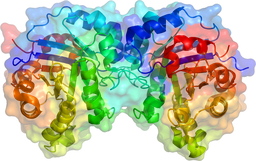In enzymology, a glutamate-5-semialdehyde dehydrogenase (EC 1.2.1.41) is an enzyme that catalyzes the chemical reaction
L-glutamate 5-semialdehyde + phosphate + NADP+
⇌
{\displaystyle \rightleftharpoons }
L-glutamyl 5-phosphate + NADPH + H+The 3 substrates of this enzyme are L-glutamate 5-semialdehyde, phosphate, and NADP+, whereas its 3 products are L-glutamyl 5-phosphate, NADPH, and H+.
This enzyme belongs to the family of oxidoreductases, specifically those acting on the aldehyde or oxo group of donor with NAD+ or NADP+ as acceptor. The systematic name of this enzyme class is L-glutamate-5-semialdehyde:NADP+ 5-oxidoreductase (phosphorylating). Other names in common use include beta-glutamylphosphate reductase, gamma-glutamyl phosphate reductase, beta-glutamylphosphate reductase, glutamate semialdehyde dehydrogenase, and glutamate-gamma-semialdehyde dehydrogenase. This enzyme participates in urea cycle and metabolism of amino groups.
Structural studies
As of late 2007, 3 structures have been solved for this class of enzymes, with PDB accession codes 1O20, 1VLU, and 2H5G.
